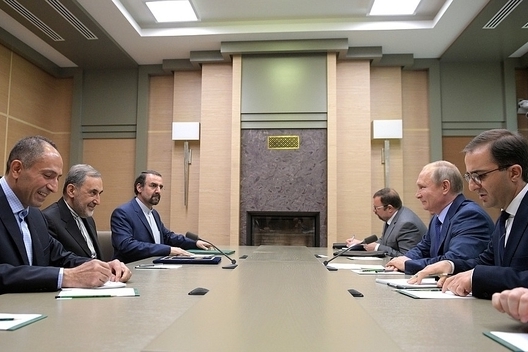 Israel’s prime minister met with Russian President Vladimir Putin to discuss Iranian presence in Syria, on the same day the Supreme Leader’s senior advisor arrived in Moscow with a message.
Israel’s prime minister met with Russian President Vladimir Putin to discuss Iranian presence in Syria, on the same day the Supreme Leader’s senior advisor arrived in Moscow with a message.
Benjamin Netanyahu told Russia’s president on June 11, “Our opinion is known that Iran needs to leave Syria—that is not something new,” hours after a Syrian drone entered Israeli airspace. According to Reuters, an anonymous official claimed that Netanyahu also told Putin, “We won’t take action against the Bashar al-Assad regime, and you get the Iranians out.”
The following day, Ali Akbar Velayati met with President Putin and delivered a message from Supreme Leader Ayatollah Ali Khamenei and President Hassan Rouhani. It’s unclear what was in the message, but some saw his coinciding appearance as a slight directed at Netanyahu, given Velayati’s alleged role—during his time as foreign minister under the Akbar Hashemi Rafsanjani presidency—in the 1994 bombing of a Jewish center in Buenos Aires that killed eighty-five people. The Argentinian foreign ministry had asked Russia to detain and extradite Velayati.
Instead, Velayati emerged from a two-hour meeting announcing that Moscow was ready to invest $50 billion in Iran’s oil and gas sector to replace Western companies leaving Tehran due to the reimplementation of US sanctions. He also said that the Russian president will be visiting Tehran to attend new Syria peace talks. It was a sign that the discussion had gone well.
The two meetings with President Putin were a build up to the July 16 summit with US President Donald Trump in Helsinki, where they will discuss various issues including Iran and Syria. Though the direction of the summit is unclear, Trump administration officials have hinted at the course the US will take on Syria.
During the US secretary of state’s visit to the United Arab Emirates this week, he made it clear that the Trump administration was not in the business of pushing a policy that the Syrian president “must go.” Mike Pompeo told UAE-based newspaper The National, “the political decisions, the constitution of Syria, will be sorted by the Syrian people.” National Security Adviser John Bolton echoed similar rhetoric on July 1 during an interview with CBS News’ Face The Nation: “I don’t think al-Assad is the strategic issue. I think Iran is the strategic issue.” According to CBS News, a senior US official and two Arab diplomats said the Trump administration has accepted the fact that al-Assad will stay in power and are now focusing their energy on driving a wedge between Moscow and Tehran.
Though the allies have had a contentious history, which includes the occupation of northern Iran during World War II and the Soviet Union’s backing of Iraqi dictator Saddam Hussein during the eight-year Iran-Iraq War, they have come along way post-Cold War. Moscow and Tehran share a mutual opposition to the West and growing interests in energy, military security, and trade. Trump might think he has leverage, but Russia and Iran have a shared interest in opposing US presence in the Middle East. They also share important partnerships in Central Asia and particularly combatting Sunni extremism.
Russia recognizes the blood and treasure spent by Iran in Syria over the past seven years. The United States wants Iran out of Syria, but President Putin will need strong incentives to oblige and it’s unlikely that he’ll ultimately accommodate Washington. Tehran has also reiterated on numerous occasions that it was invited to Syria, and it will not leave the country unless asked by the Assad government.
That hasn’t stopped some Iranian media outlets and politicians from speculating that Moscow will deceive Tehran. A Reformist MP said before parliament on June 27 that Damascus and Moscow would “soon sacrifice” Iran for the United States and Israel. “Bashar al-Assad, with full impudence, has cozied up to Putin. Russia will not be a trustworthy friend for us.” In the wake of these concerns, Velayati argued, “Russia can neither force nor intend to force Iran. We are cooperating with this country on defensive issues, and Russians have given us more or less everything we wanted so far.”
What Moscow can do is reign in Tehran and its Shia proxies by keeping them away from the UN-monitored demilitarized zone that has separated Israel and Syria since 1973. According to the New York Times, Putin reportedly told Netanyahu that they had pushed back forces “tens of kilometers” from the frontier. One unnamed senior Israeli military official hailed that such a move would be a momentary “success”—although Israel would continue to insist on withdrawing all Iranian forces and proxies as well as continue its air strikes, if necessary.
The nineteenth century British Prime Minister Henry John Temple said when it comes to international affairs, there are no permanent friends or enemies, only permanent interests.
Understanding Iran’s future in Syria will depend on what Russia wants.
Holly Dagres is editor of the Atlantic Council’s IranSource blog, and a nonresident fellow with the Middle East Security Initiative in the Scowcroft Center for Strategy and Security. She also curates The Iranist newsletter. Follow her on Twitter: @hdagres.
Image: Russian President Vladimir Putin meets with senior adviser to the Supreme Leader of the Islamic Republic of Iran on international issues, Ali Akbar Velayati. (The Kremlin)
